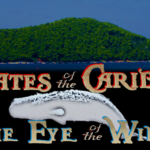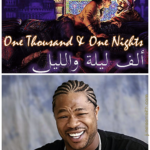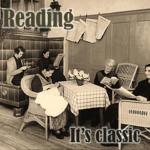 With Valentine’s Day close approaching, most of you are thinking of two: yourself and that special someone.
With Valentine’s Day close approaching, most of you are thinking of two: yourself and that special someone.
But, Golden Girls fans might be thinking of three, due to one of the most quotable quotes of the series, from an episode called “Valentine’s Day.”
 In a pharmacy, the three youngest Girls are preparing for a romantic weekend with three men. Blanche hints that they should take “protection” with them. After Rose guesses incorrectly what Blanche means (three times!) Dorothy blurts out:
In a pharmacy, the three youngest Girls are preparing for a romantic weekend with three men. Blanche hints that they should take “protection” with them. After Rose guesses incorrectly what Blanche means (three times!) Dorothy blurts out:
Condoms, Rose! Condoms, condoms, condoms!
That thrice repeated emphasis is an example of what the Romans called omne trium perfectum, meaning “every three is perfect.” We see this pattern both in literature and the visual arts. In photography and painting, it is often called the Rule of Thirds. You can actually see this in the Golden Girls gif at right, wherein Dorothy is the middle third of the image.
In writing, it is called the Rule of Three. But, although all threes may be perfect, not all threes are the same. For the benefit of my readers who are also writers, I want to discuss the various forms of the Rule of Three and, in honor of season three of Black Sails, I’ll include a few examples from that popular and well-written series.
Continue reading →
 I watched Warcraft this past weekend. Throughout the first half of the film, I was confused. The story wasn’t boring, but it was somehow unsatisfying. The characters were well-defined, but were not engaging. The dialogue wasn’t bad, but it kept falling flat.
I watched Warcraft this past weekend. Throughout the first half of the film, I was confused. The story wasn’t boring, but it was somehow unsatisfying. The characters were well-defined, but were not engaging. The dialogue wasn’t bad, but it kept falling flat.

 In a pharmacy, the three youngest Girls are preparing for a romantic weekend with three men. Blanche hints that they should take “protection” with them. After Rose guesses incorrectly what Blanche means (three times!) Dorothy blurts out:
In a pharmacy, the three youngest Girls are preparing for a romantic weekend with three men. Blanche hints that they should take “protection” with them. After Rose guesses incorrectly what Blanche means (three times!) Dorothy blurts out:
 This is going to be one part writing advice, one part literary theory, and several parts fan fiction to show how it all works.
This is going to be one part writing advice, one part literary theory, and several parts fan fiction to show how it all works.


 The difficult thing about creating a fictional alien species is that if they are too familiar, they seem inauthentic. Slap some bumps on the forehead and voilà : every Star Trek alien ever. And, the Star Trek franchise eventually had to explain this phenotypical homogeneity (ask a fan, but it’s in a Next Generation episode) to keep the credibility of the milieu intact.
The difficult thing about creating a fictional alien species is that if they are too familiar, they seem inauthentic. Slap some bumps on the forehead and voilà : every Star Trek alien ever. And, the Star Trek franchise eventually had to explain this phenotypical homogeneity (ask a fan, but it’s in a Next Generation episode) to keep the credibility of the milieu intact.
 It’s time for another installment of my series on avoiding words and phrases that derive from a technology that’s not present in the story you’re writing.
It’s time for another installment of my series on avoiding words and phrases that derive from a technology that’s not present in the story you’re writing.
 In the intro cinematic for the popular Medieval fantasy video game, Skyrim, the player finds herself in a wagon full of prisoners being hauled to a fort for punishment. When the wagon arrives, one of the prisoners mutters that it’s “the end of the line.”
In the intro cinematic for the popular Medieval fantasy video game, Skyrim, the player finds herself in a wagon full of prisoners being hauled to a fort for punishment. When the wagon arrives, one of the prisoners mutters that it’s “the end of the line.”
 Of course, the big news in the literary world is the passing of Anne McCaffrey. The best tribute (I have read) to this amazing author is by Juliette Wade, who
Of course, the big news in the literary world is the passing of Anne McCaffrey. The best tribute (I have read) to this amazing author is by Juliette Wade, who 
 After my brief detour through Charles Bukowski‘s
After my brief detour through Charles Bukowski‘s 